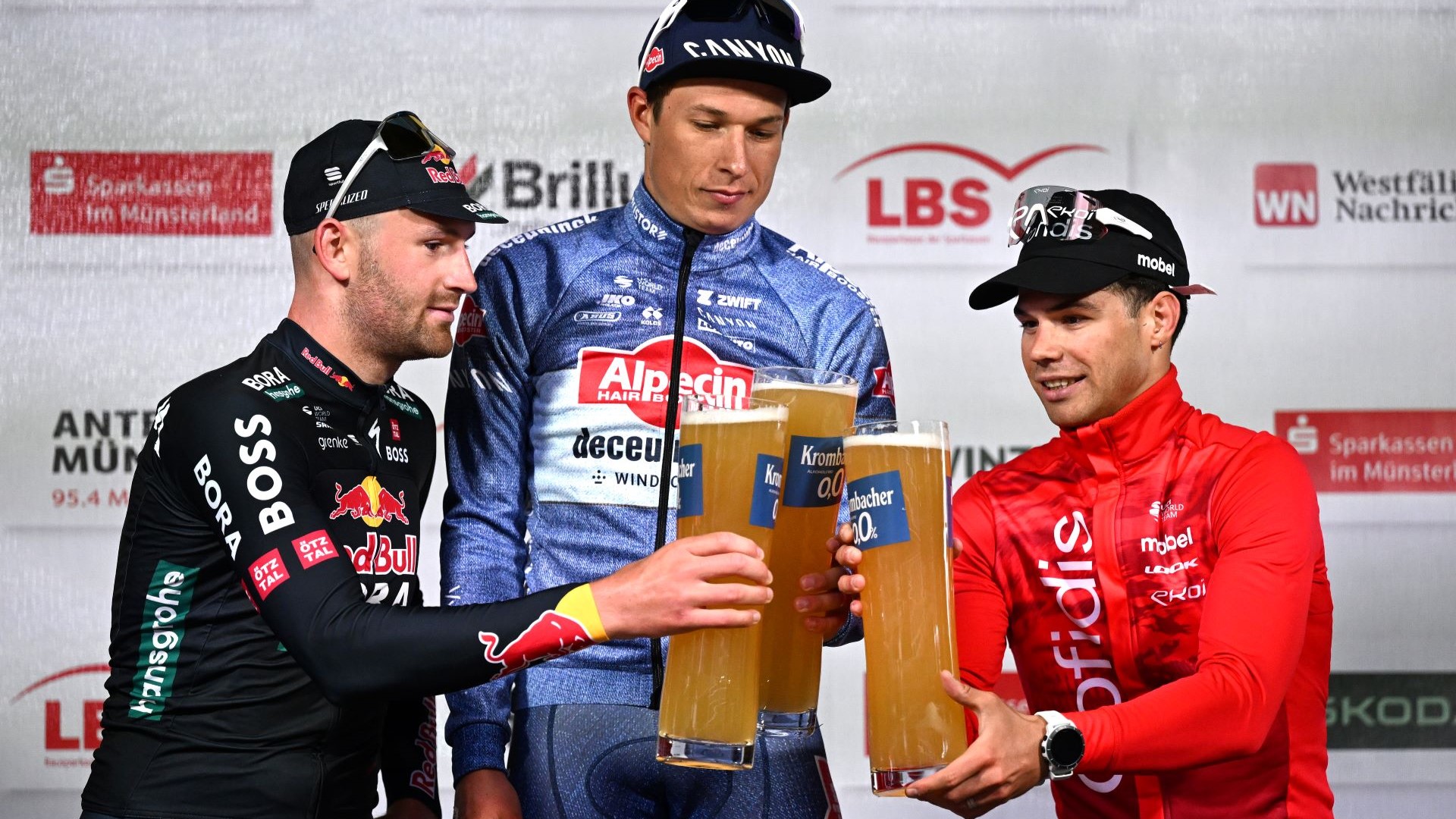My entry into biking almost a decade in the past was by way of a weekly social journey the place we (unoriginally) joked that we had been “a consuming membership with a biking drawback.” Certainly, almost each journey began with a pre-ride pleased hour, included a mid-ride beverage cease, and ended at a bar the place we’d have fun the journey, swap tales and down just a few extra drinks. Whereas maybe my journey membership is an excessive instance, biking tradition is deeply interlaced with consuming tradition. Simply take into consideration the beer-fueled followers at cyclocross races, the plush vineyards showcased throughout the Tour de France, the sacred post-ride beer custom or the numerous beer and wine sponsors of group kits.
Whereas many individuals benefit from the addition of a post-ride drink as a social lubricant, I’ve personally been battling the ubiquity of alcohol in biking tradition, and the way I slot in as a non-drinker. I stop consuming almost two years in the past after realising it introduced me no advantages Nevertheless, now I’m usually left to marvel – can biking nonetheless be a social outlet as a non-drinker?
After I was actively consuming alcohol, I hardly seen how alcohol permeated my biking life. From downing pictures of whisky throughout cyclocross races to charity brewery rides to being awarded a finisher’s beer after Unbound Gravel, consuming alcohol throughout or after rides has change into normalised and even celebrated. As a non-drinker, nevertheless, I now see simply how intertwined alcohol and biking have change into, and it usually leaves me feeling like an outsider within the sport I really like. On a latest social journey, for instance, we stopped for almost an hour at a park for trail-side beers. Whereas everybody else imbibed, I used to be left ready considerably impatiently – I got here to journey bikes, not drink in a park. Consuming alcohol might not be compulsory, nevertheless it’s definitely the cultural norm.
It’s nearly ironic that in a sport so closely centered on well being and health, alcohol—a identified carcinogen—performs such a distinguished function. Past its long-term well being dangers, alcohol may negatively impression efficiency and restoration, notably when consumed instantly after train.
“One, alcohol is a diuretic, so it dehydrates you extra rapidly, and in the event you’re already dehydrated, you will get into an much more dehydrated state,” warns sports activities dietician and biking coach Kristin Arnold, MS, RDN, CSSD.
Alcohol additionally hinders vitamin absorption and glycogen restoration, each of which may impair restoration and general efficiency.
“Regardless that there are technically carbohydrates in beer, the alcohol within the beer stunts glycogen replenishment, so even in the event you had carbs from meals with the beer, a few of these carbs will not be going to really go in the direction of glycogen replenishment,” Arnold defined.
“After which, [alcohol] additionally inhibits the absorption of sure nutritional vitamins and minerals, particularly B nutritional vitamins. and may stunt muscle protein synthesis or rebuilding of muscle after train.”
However alcohol isn’t all dangerous, Arnold says.
“There are professionals and cons to consuming alcohol post-rides. A few of the professionals are that it brings the neighborhood collectively, it’s an effective way to construct camaraderie and have a pleasurable expertise with teammates and buddies and neighborhood members,” she mentioned.
“I believe it’s undoubtedly okay to have a drink, particularly if it’s in a social setting…and when the efficiency positive factors and specificity of coaching is much less demanding, like if an athlete is on a relaxation week or a transition time or if they only received accomplished with an enormous race and are going to be taking a break afterwards.”
Fortunately for me, and non-drinkers in all places, non-alcoholic beer choices are more and more prevalent, permitting everybody to take part within the post-ride enjoyable. From 2021 to 2022, gross sales of non-alcoholic drinks within the U.S. confirmed a 20.6% year-on-year progress. Many breweries additionally provide non-alcoholic choices, together with kombucha and soda, broadening the selection for non-drinkers. This rising curiosity in non-alcoholic choices may even be seen in occasion sponsorship, with non-alcoholic manufacturers similar to Finest Day Brewing and Athletic Brewing having a big presence at biking occasions like Unbound Gravel and Large Sugar Gravel.
Many individuals journey bikes particularly for the social facet of it, relishing the post-ride hangout as a time to make new buddies and connections. I’m under no circumstances advocating that this custom goes by the wayside, however I do assume there are methods to make it extra inclusive for non-drinkers. As a substitute of ending each journey at a brewery or bar, swap it up and end at a location that doesn’t centre on alcohol, similar to a espresso store or juice cafe.
In a sport that celebrates neighborhood and connection, it’s price asking whether or not our traditions really mirror these values or if there’s room to evolve. I nonetheless love biking and the camaraderie it fosters, however I’ve come to understand that alcohol doesn’t must be on the centre of it.
Making area for non-drinkers doesn’t take away from the enjoyment of a journey; it solely provides to it, making a extra inclusive and welcoming setting for everybody. By shifting the main target from what’s in our glass to the connections we share, we will have fun the post-ride moments in a manner that brings everybody collectively—whether or not it’s over espresso, kombucha, pizza or N.A. beer.

